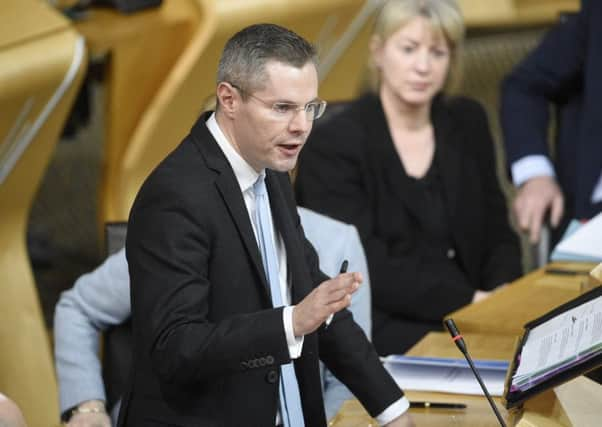Bill Jamieson: SNP has a reality check about the levers of financial power


Well, now we know: life was never going to be that simple. There are limits – hard and immutable limits – that beset finance ministers of all political hues. Even the Labour firebrand Aneurin Bevan had to lecture his own party with the famous admonition: “the language of priorities is the religion of socialism”.
But for all the dashed hopes and disappointment in Scotland today, Finance Secretary Derek Mackay has recognised the limits imposed by the economic times we are in and presented a budget last week that at least puts the administration on a path of fiscal realism.
Advertisement
Hide AdAdvertisement
Hide AdMoans and groans there are a-plenty. Cosla howls at yet more local authority budget cuts. The Labour opposition protests that he did not introduce a new 50p top rate of income tax. Business warns of the consequences of setting a course to make Scotland the highest taxed part of the UK.
Liz Cameron of the Scottish Chambers of Commerce said: “Creating a differential between tax bandings north and south of the border will set a dangerous precedent.
“Ultimately, growing our economy rather than increasing taxes will provide the most sustainable route towards boosting tax revenues and thus public sector spending.
“If Scottish businesses and Scottish-based staff are taxed more, that would not seem to be a situation designed to attract investment and grow Scotland’s economy.”
The threshold for the 40p rate of income tax will rise by inflation in Scotland to £43,430 next year, but to £45,000 in the rest of the UK under Westminster plans to ease taxes on higher earners. The result is that middle income households will pay an average of £314 more per head next year than their counterparts south of the border. That will make it more difficult for Scots companies to attract skilled staff from elsewhere in the UK. The Conservatives plan to raise the threshold further, to £50,000 by 2020-21, while Scots will face a threshold of £46,551, meaning an additional £700 more on average north of the border.
Middle earners also face significantly higher council tax charges next year.
Rates for Band E to H properties rise automatically in 2017 under SNP plans to make the tax more progressive, with the largest homes billed an extra £500 a year. And the Finance Secretary suggested councils could increase bills across all bands next year to raise £70 million for local services.
Meanwhile the £50m cuts to the budgets of the Enterprise agencies – a fifth of the total for Scottish Enterprise, Highlands & Islands and Scottish Development International – sit ill with the rhetoric of economic growth and business uplift. It is all the more questionable in the context of Brexit uncertainties and the increasing need for Scotland to compete effectively on the global stage
Advertisement
Hide AdAdvertisement
Hide AdBut Scotland is still heavily steeped in a high spend culture. “Success” in politics has long been measured by the amount by which public spending was increased or support through the Barnett Formula raised, not by tax reduction.
The louder political noise continues to come from those demanding an impossibly wide range of public spending demands, met where necessary by resort to ever higher tax, direct or indirect. And many of these “six impossible things before breakfast” have come from within the SNP itself and its ranks of MPs and MSPs. There is barely an economic liberal among them.
And for all the pain inflicted, the decision to hold the higher rate threshold down will only increase Scotland’s budget by £125m. The Scottish government forecast is that total income tax revenue will amount to only £11.8 billion from a total Scottish Government budget of £37.9 bn in 2017-18.
As the Association of Chartered Certified Accountants warns, the experience around stamp duty “should provide a salutary lesson for the government that increased taxation powers does not directly correlate to more money in the pot for public spending”.
On the positive side, the boost to infrastructure budgets such as roads and the digital network has been well received, as has the decision to match the basic business rates poundage to that south of the border, bringing an overall decrease in rates revenues. The expansion of 100 per cent relief to businesses with a rateable value of up to £15,000 has also been welcomed. However, despite increasing the threshold of the Large Business Supplement to £51,000, this surcharge still leaves Scotland the highest taxed nation in the UK in terms of business rates.
As for the likely impact of the budget on Scotland’s economic performance, the effects are likely to be modest at best. The “good news” from the Fraser of Allander Institute is that it is no longer warning of recession as it did earlier this year and has raised its forecasts for 2017.
Its central forecast is for growth of 1.1 per cent in 2017, 1.3 per cent in 2018 and 1.6 per cent in 2019 – an upward revision of about 0.15 percentage points per quarter for 2017. Hardly cause to crack open the champagne – this still puts Scotland below the modest OBR forecasts for the UK – 1.4 per cent next year, 1.7 per cent for both 2018 and 2019.
This was not a Scottish budget that set us on course for a reset as I argued last week, still less one for a performance transformation. But at least we are seeing an administration becoming slowly wise to the realities of the world we are in – and the clear dangers that lie in store should it proceed further down the path of higher income and business taxation.